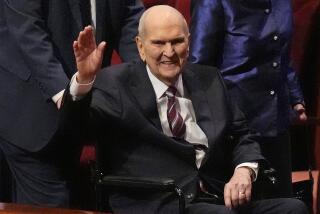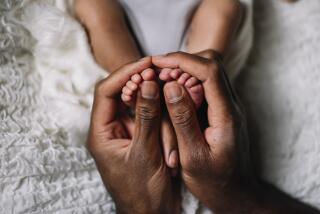For Mormons, Generations Are Bound
I have my grandmother’s eyes. I see it so clearly when I look at her wedding photo, my face mirrored in hers. She held fresh roses in her lap that day. I like roses. She died before I could walk.
Her name was Edith Winters Lubeck. My middle name is Edith. It’s out of fashion these days.
This much I know of her: She was born March 10, 1893, the youngest of 11 children, and grew up on a cattle ranch in central Nevada. She loved books and attended the University of Nevada, where she received her teaching degree. She taught in a one-room schoolhouse in Deeth, Nev., fell in love with a handsome young man with a winsome way, moved to Utah with him and reared three boys. She loved music, beautiful flowers, and nature. My father told me these things.
I love books, music, flowers, and taught English a bit after finishing graduate school in Utah. Later in life, at 41 years, I married a handsome man with a cat and a grand piano, and I moved back to California. I brought my own piano.
My father’s family came from Denmark to Utah. My mother’s family followed a similar path: They were Mormon pioneers who came round the Cape to gather at their new Zion--Salt Lake City. Some of her forebears traveled across the Plains in a wagon or by foot. I know these things because my family keeps records. Mormons generally do that. We continually search out records and stories of our ancestors, binding one generation to another through paper and pen.
The records extend over many generations. Our family has journals and stories back to great-great-great-grandparents and beyond. I am drawn to these people, their joys, their sorrows while on this Earth. They bring me wisdom and courage. I sometimes feel their love.
I’ve kept journals since I was 12. They line the tiny bookcase above my desk. I’ll eventually pass them on to a niece or nephew, since I have no children.
We work to find out about our kin. My sister Nancy and I traveled to Lybaek, Denmark, to find out more about our great-great-grandfather Anton Iver Christensen Lubeck. We found the rocky farm he tilled, the simple house he lived in. My brother Michael trolls cyberspace for family associations that link up with our family names. He’s reeled in some whoppers, a succulent feast of information about our ancestors.
This search for our ancestors ultimately ties to our temples and theology.
Temples are important to our faith. In California we have temples in Los Angeles, San Diego and Oakland. Faithful members may enter temples as they live by certain standards, including being honest with others, observing our health code, tithing, abstaining from premarital sex and being faithful during marriage. Temples are closed on Sundays, when we attend sacrament meetings in our chapels.
In a temple, we make covenants with God pertaining to purity, service and devotion. We make marriage covenants with God that bind our spouse and future family to us for eternity.
We believe that God has instructed us through revelation to make these eternal blessings available to our progenitors, and so we perform the ordinances of baptism, endowment (commitment to God) and marriage for eternity for them, by proxy. It is a labor of love. They may accept or refuse these covenants.
Through holy priesthood power from Jesus Christ, these covenants and ordinances bind one generation to the next. We believe that all of us on this Earth are ultimately brothers and sisters in the same family, and that through temple “sealing” of our families together, and keeping our covenants, we will be with our families, our God and our savior throughout all eternity.
We do not believe in a single option of heaven or hell for individuals, but that there are several degrees of glory for mankind.
We grieve for loved ones who die, but rejoice that we will be with them once again, through the atoning power of our savior.
Thus, we research our family roots. The Church of Jesus Christ of Latter-day Saints operates more than 3,400 family history libraries worldwide, with more than 60 of them in Southern California. The public may use them free. Our church recently launched the largest single site of genealogical records on the Web, https://www.familysearch.org, to facilitate ancestral research.
A few years ago, after I moved to Southern California, my sister Judy and I traveled to Santa Barbara, where my grandparents settled late in life. We visited the cemetery where they were buried. Their graves looked out over the ocean. We placed sprays of fresh, salmon-colored orchids on their graves. I thought Grandma Lubeck would find pleasure in that. When I see her again, I will find out what color she prefers in roses. I know she likes them.
*
On Faith is a forum for Orange County clergy and others to offer their views on religious topics of general interest. Submissions, which will be published at the discretion of The Times and are subject to editing, should be delivered to Orange County religion page editor Jack Robinson.
More to Read
Sign up for Essential California
The most important California stories and recommendations in your inbox every morning.
You may occasionally receive promotional content from the Los Angeles Times.










